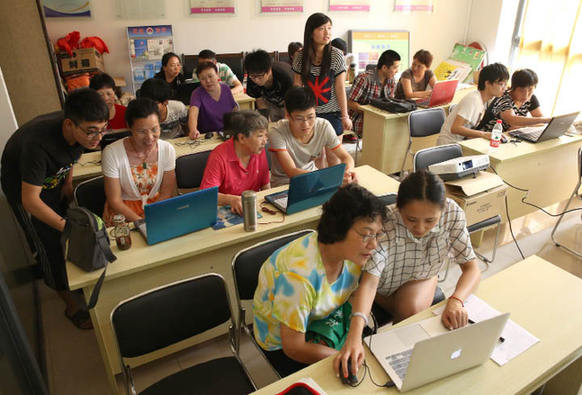Internet Is Changing Chinese Society
By staff reporter GONG HAN
On April 20, 1994, China accessed the Internet for the first time through a 64k international special line, the 77th country in the world to do so. This news was not a big deal at that time, as many people did not even know what the Internet was.
Now two decades have passed. As of December 2013, China’s Internet community had reached 618 million people, with a penetration of 45.8 percent. Half a billion people used mobile phones to access the Internet. Chinese netizens now account for 73 percent of the urban population and 25 percent of the rural population, covering over 80 percent of young people.
Along with the rapid economic rise of the past 20 years, the Internet has changed several aspects of Chinese life – information, communication, socializing, commerce, entertainment and finance. It creates a vigorous e-commercial wave, opens up new channels to express public opinion, and even influences China’s political ecology.
As Ma Yun, executive chairman of the Alibaba Group, said, the Internet is not only a technology or an industry, but also a value. It is open and transparent, and knows about sharing and responsibility.
To China, the Internet is not merely a technical revolution, but a profound social reform, propelling China towards greater vitality and openness.
 |
|
Elderly residents in Zhenjiang City, Jiangsu, study computer networking skills under the guidance of college seniors. |
Another Form of Openness
When China first got access to Internet in 1994, it was limited to a small circle of computer professionals.
In early March 1995, Zhu Ling, a female student at Tsinghua University, fell into a coma. Several of her classmates translated her condition into English and put it online, requesting medical expert consultation worldwide. With the help of online experts she was correctly diagnosed with thallium poisoning.
In autumn 1996, a huge advertising board was erected in Zhongguancun, a technology hub in Beijing. It said: “Distance to the information highway – 1,500 meters northwards.” The place was China’s first Internet bar, with 50 computers, at a charge of RMB 30 per hour.
In 1997, China Internet Network Information Center (CNNIC) released China’s first authoritative Internet statistical report. Among 620,000 Internet users nationwide, over one-third were in Beijing, and one-10th in Shanghai. Nearly 80 percent of them were young people aged between 21 and 35. In those days connections were slow and prices high. It took several minutes to download a picture, and average salaries were no more than RMB 1,000. Some surfers at the Internet bar spent RMB 2,000 in a single trip.
In 1998 China’s online population reached 1.175 million, with increasingly curious young people entering the brave new world through this portal.
“In addition to opening up in economy, politics and culture, such as establishment of special economic zones and joining the WTO, access to the Internet is another form of opening-up,” said Hu Yanping, founder of the Data Center of China Internet (DCCI).
